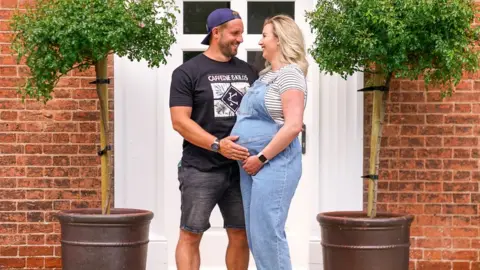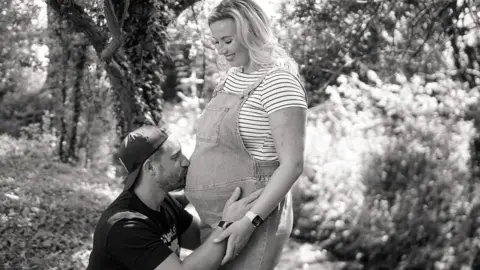Baby death raises questions over maternity care
 BBC
BBCBeth and Dan Wankiewicz want answers about why their baby son Clay died last year, shortly after his birth at Doncaster Royal Infirmary.
Despite a low-risk pregnancy, the family say Clay died from multiple skull fractures.
Doncaster and Bassetlaw NHS Foundation Trust said "the provision and delivery of high-quality" care is a priority.
The BBC has found a 2016 review flagging concerns about the hospital's maternity care was never published.
The report - one of scores of unpublished reports discovered by a Freedom of Information request by BBC's Panorama programme - highlighted significant patient safety concerns.
Beth Wankiewicz was admitted to hospital last July, but after a day of labour her baby had still not been born.

With no consultant doctor on site, a junior doctor made two attempts to deliver the baby with forceps, after getting advice on the phone.
C-section
Dan remembers the second attempt with forceps being much more vigorous "which was a bit of a shock".
The family say there was a further delay before they had a Caesarean section. Their baby had to be pushed back up the birth canal into the womb for the C-section to be performed.
"I think after about 10 minutes, we both looked at the clock, and we said it's not looking good," said Dan.
Around 20 minutes after their son was born, despite attempts to resuscitate him, they were told he had died.
The following day they say a midwife told them she was being pressurised by other staff to say Clay had been stillborn, but she was sure he had been born alive, and she had heard a heartbeat.
The family now believe this was to avoid scrutiny and the need for a coroner's inquest, which doesn't happen with still births.

Beth and Dan say Clay's post-mortem shows he died of multiple skull fractures.
David Purdue, chief nurse and deputy chief executive of Doncaster and Bassetlaw Teaching Hospitals NHS Foundation Trust, offered sympathy to the family, and said the Healthcare Safety Investigation Branch had drawn up a report into the case with findings that had been shared with the trust, the family and the coroner. He said an inquest would be held soon.

BBC investigation
A BBC investigation has now found that in 2016 a review of services by the Royal College of Obstetricians and Gynaecologists identified serious patient safety concerns within maternity services at the trust, but it had not been published.
The trust had asked for the review following a "number of serious clinical incidents".
Some of the concerns were that:
- There was a lack of appropriate leadership
- There were patient safety concerns around the lack of availability of consultants
- Undermining of staff was evident, mainly but not exclusively within midwifery.
Following a 2015 maternity scandal at Morecambe Bay, in which 11 babies and one mother died, a report by Dr Bill Kirkup recommended that trusts openly report the findings of any external investigation.
The BBC showed the 2016 report to the family, who hadn't seen it before.
"My heart just dropped... reading point after point of things that resonate with us in Clay's care that had been picked up in 2016 ' said Beth.
"It was just heartbreaking to know that they knew back then"

Natalie Cosgrove, the couple's solicitor, said she had represented several families since the review, where the issues identified have been a factor.
She said: "My concern is why those concerns have not been acted upon by the trust."
Peter Walsh, head of the charity Action against Medical Accidents, said: "I found it very worrying. Frankly, it's very reminiscent of reports I've seen into other trusts where the problems have become huge scandals: Morecambe Bay, Shrewsbury and Telford."
David Purdue, deputy chief executive of the trust said : "The provision and delivery of high quality maternity services is our number one priority. Following the invited report from the Royal College in 2016, we shared the executive summary, recommendations and action plans with our regulators, partners and staff and have completed all of the actions."
In a statement, the health regulator in England, the Care Quality Commission said: "We liaised with the trust regarding the steps they were taking to respond to the review and address the recommendations of the Royal College of Obstetrics and Gynaecologists, and where we had concerns that the recommended actions were not being progressed fast enough, we called for improvements."
Maternity services at both hospitals run by the trust are currently rated as Requires Improvement by the hospital regulator.
A spokesperson for the trust said the summary, recommendations and actions had been available "upon request" and shared with commissioners and regulators.
An NHS England spokesperson said: "Throughout the pandemic the NHS has safely delivered thousands of babies while keeping staff and patients safe, and the NHS announcement of an additional £95 million to boost maternity services will improve women's experience further.
"All independent reviews should be made available to relevant health commissioners and regulators...and [we] expect trusts to take prompt action to address appropriate recommendations."
